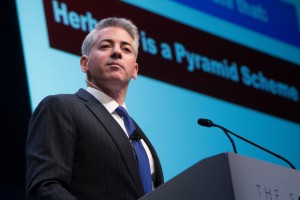There is always excitement when a hedge fund initiates an activist campaign against a company’s management to bring about changes. Such funds, called activist funds, play an active approach to investing in stocks by taking large positions and often waging an open battle with the management to force changes. Now a report from Goldman Sachs has found that such activist hedge funds significantly outperformed passive equity hedge funds in the last two years. The Goldman report reviewed data from 778 hedge funds which have $1.8 trillion in gross equity positions among them and found that activist hedge funds generated 40 percent return in the last two years compared to 23 percent by rival passive equity hedge funds.
Investor Activism At 5 year High
 The report found that hedge funds played a dominant role in most activist campaigns in the last decade. Between the years 2005 and 2013, hedge funds played lead roles in 64 percent of the activist campaigns. Last year, hedge funds led 75 percent of the activist campaigns. One of the widely followed ongoing activist battles is between the hedge fund manager Bill Ackman, who runs the hedge fund Pershing Square, and nutrient supplement supplying firm Herbalife. Ackman is alleging that Herbalife is a pyramid scheme and is urging regulators to investigate the firm. Ackman holds a large short position on the stock.
The report found that hedge funds played a dominant role in most activist campaigns in the last decade. Between the years 2005 and 2013, hedge funds played lead roles in 64 percent of the activist campaigns. Last year, hedge funds led 75 percent of the activist campaigns. One of the widely followed ongoing activist battles is between the hedge fund manager Bill Ackman, who runs the hedge fund Pershing Square, and nutrient supplement supplying firm Herbalife. Ackman is alleging that Herbalife is a pyramid scheme and is urging regulators to investigate the firm. Ackman holds a large short position on the stock.
The number of activist campaigns has been increasing steadily in the last five years and totaled 129 in 2013, the highest since 2009. The first two months of this year have resulted in 25 campaigns, higher than 22 campaigns in the first two months of 2013. Activist campaigns were red hot in the years 2007 and 2008 when about 155 campaigns were launched in each of those two years. The number plunged to about 70 in 2009 following the Lehman collapse before making a steady recovery in recent years.
Activist Targeted Stocks Outperform in Recent Years
Stocks targeted by activist investors are generally known to make wild moves. The Goldman analysis found that since the year 2010, stocks targeted by activist funds outperformed the Russell 3000 index every year in the immediate three months following the initiation of an activist campaign. The gains were the most in the first month post the campaign announcement. The outperformance of activist-targeted stocks over Russell 3000 was 352 basis points last year in the three months post the announcement. The data also found that such stocks lagged the Russell 3000 in the first three months after a campaign in the years 2007 to 2009.
Impact on Job Market
Launching an activist campaign is often a costly affair. Hedge funds undertaking activist campaigns typically embark on making big changes to a firm. Last year, 34 percent of activist campaigns were aimed at getting board representation and a further 14 percent were to get board control. Most often company management doesn’t give in to the activist funds’ demands easily and hedge funds are required to incur significant expenses to persuade investors to back their efforts.
The data on the number of activist campaigns in the last 10 years suggests that the campaigns increased when the economy and the stock market did well. In an uncertain economy, a fund may be reluctant to commit to a costly proxy war. The steadily increasing activist campaigns in the last few years may point to growing confidence of hedge fund managers about the economy, which could have a positive impact on the job market.






Comments on this entry are closed.